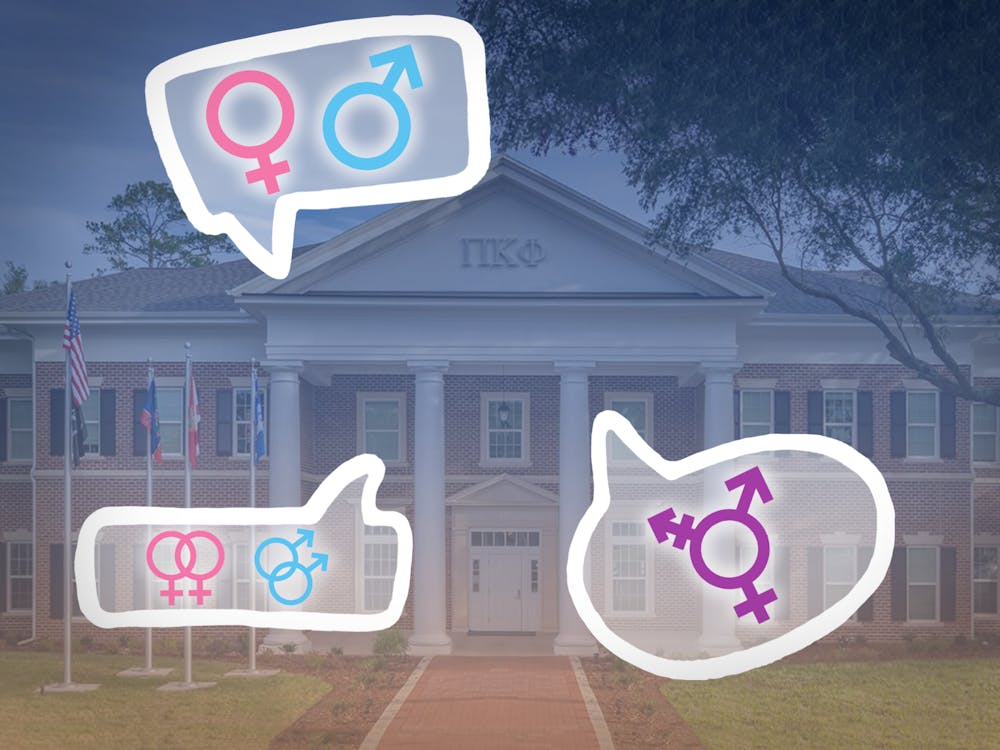UF Student Government’s new Gender and Sexuality Protection agency announced its foundational goal of making “our campus a more inclusive environment for all of our students” in its first Instagram post July 31.
The Gender and Sexuality Protection agency, or GASP, describes its goal as protecting and advancing equality for all genders and sexualities on campus. The self-proclaimed DEI agency is funded through the Student Senate. Meanwhile, some students have met the agency’s creation with skepticism.
GASP agency head Riley Towbin, a 20-year-old UF history and women’s studies junior and member of the LGBTQ+ community, said it serves to help students feel safe and welcome on campus.
“I just want to make sure that everyone knows that no matter how they look and no matter how they present themselves,” Towbin said. “They have a space for themselves in the queer community, even in spaces that aren’t necessarily considered queer.”
While Towbin acknowledged that other SG organizations dedicated to providing inclusion and education, such as the Pride Student Union, do exist, she wants the agency to connect with students who might not typically engage with advocacy, especially Greek life.
The five-member agency is looking to give presentations related to gender and sexuality to clubs, like sororities and fraternities, which would embrace inclusive language and intersectionality, Towbin added.
GASP will hand out popsicles in the Plaza of the Americas from 11 a.m. to 2 p.m. Sept. 5 to introduce students to the agency. The agency hopes to hold other events this semester, Towbin said, including an allyship event to promote support for the LGBTQ+ community.
Towbin proposed another event, called “Take Back the Night,” that would promote safety and empowerment for women and other commonly targeted students when they are walking home at night.
“When you hear ‘gender and sexuality,’ you think LGBTQ+ only,” Towbin said. “But we also really want to harp on the fact that gender is something that’s really important to us and along with gender comes the idea of sexual violence awareness and sexual violence prevention.”
However, not all students are convinced by GASP’s messaging. Syd Engstrom, a 20-year-old UF sociology junior who is part of the LGBTQ+ community, said they were concerned with what GASP has not said.
“They call themselves a protection agency, but have made no explicit reference to what we as queer people are being protected from,” Engstrom said. “There was a vague allusion to combating gender inequality, but inequality is perpetuated by the individuals, usually the state government or the Board of Trustees at UF, and there’s been no mention of that.”
GASP has also made no mention of recent campus developments, like the removal of Lavender LLC, or state legislation, like a law that went into effect last summer that requires people to use bathrooms that align with their gender assigned at birth.
Another topic GASP has not mentioned is the university’s decision to fire 13 full-time DEI officers, among other positions, last March. When asked about GASP’s role in light of DEI cuts at UF, Towbin said questions of that nature should be directed to Student Body President John Brinkman.
Engstrom also said the agency’s social media posts do not explicitly mention certain queer groups. GASP’s Instagram has no direct mention of the dangers that homophobia and transphobia pose to the queer community.
To protect students, Engstrom added, the agency should first acknowledge the issues and obstacles that the LGBTQ+ community faces across campus. But Engstrom said they don't expect that from SG’s leading powers.
“I don’t think they exist to benefit students,” Engstrom said,. “So I’ve stopped expecting them to.”
Erin Huguenin, a 20-year-old UF history senior, shared similar concerns. Huguenin also felt uncomfortable with one of GASP’s posts’ phrasing, which referred to a person’s sense of being either male, female, or “something else entirely.” To her, the phrasing came off as condescending and out-of-touch, she said.
Huguenin questioned whether GASP can provide services to UF’s queer community that other organizations don’t already provide.
“There’s already a lot of organizations on campus for women [and] for queer students,” she said. “This just seems like they’re not coming at it from a perspective of actually furthering the cause and more so it just seems like a resume builder.”
Huguenin said if GASP wants to make a positive change, it should challenge state laws pertaining to higher education or stand up for queer students through actions like protests.
She views GASP as an internal effort of SG to appear more inclusive and accepting without “having to do anything subversive.”
“What we need to be protected from, frankly, is the people that these organizers are friends with,” she said.
Robin Anstett, a 20-year-old UF computer science junior, on the other hand, said they were happy to see GASP’s creation. Anstett is the queer cultivation program director for the Pride Student Union. They find GASP to be essential for SG to equally represent gender and sexual diversity on campus.
Anstett said they wanted to see GASP produce “programming that reflects the wants and needs of queer students, especially as some of our safe spaces have been altered or taken away.”
While Anstett said they understood why students might feel frustrated at GASP’s lack of political discussion, they understand the difficulty of managing an agency through SG and abiding by university requirements.
“I think that, regardless of party lines, there’s a lot of good that can be done in Student Government,” Anstett said.
Editor's note: In an earlier version of this article, Syd Engstrom was referred to with the "she" pronoun. That has been corrected to the "they" pronoun.
Contact Avery Parker at aparker@alligator.org. Follow him on X @AveryParke98398.
Avery Parker is a third-year English and History major covering university affairs for The Alligator. Outside of reporting, Avery spends his time doting on his cats, reading, and listening to music by the Manwolves.






